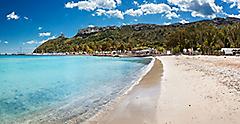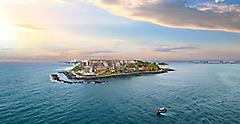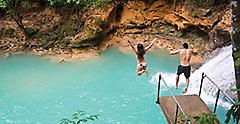Night Scuba Diving Into The Dark Abyss
The ocean looked like an infinity pool made of tar, while in the distance, a lightning storm cracked through the sky. It was a stark contrast to the blue skies and aquarium-like conditions I'd been diving in around the tropical paradise of Koh Tao, Thailand only days before.
I moved slowly as I stepped onto the dive boat, taking care not to slip on any slick surfaces in the dark, then found a seat next to my dive guide before we headed toward the site where I'd venture out on my first night dive. The engine rumbled and dive tanks clanked together, while the chattering of fellow divers was punctuated by the clicks of buckles as they checked their gear. After a few minutes, I tuned out the noise and wondered whether the churning in the pit of my stomach was caused by excitement or fear. Though I put on a brave face for the other divers, I wondered whether my fears of darkness and deep water would get the best of me.
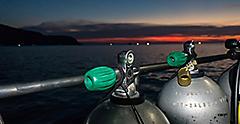
Finally, at the prompting of my dive guide, I stepped from the boat into the black ocean. Everything became silent as I plunged into the water, and the only sound that broke the silence was the steady rhythm of my breathing. My eyes followed the laser-like beam of my flashlight as I acclimated to the dark, while anything not in my light's path stayed cloaked in black. When we reached our target depth of the dive, my body drifted weightlessly in the water like an astronaut suspended in space.
My dive guide drew a big circle on the sea floor, the underwater way of asking if I was OK. I painted a circle with my flashlight in response, confirming that I was. I felt tension release from my shoulders as if I'd reassured myself, too.
The sea always puts me in a state of wonder. Creatures, colors and sensations I never knew existed are just a short boat ride away from shore. The tranquility of the water under the night sky added to my awe.
I followed my guide to a coral bommie made up of many different corals. Species of fish I'd seen buzz around during the daytime now hid in the nooks and crannies of the reef, lulled into a state of sleep. As our flashlights worked like spotlights, revealing the after-dark behaviors of creatures, my perceptions of the creatures began to change. For example, a triggerfish, a feisty fish with buck teeth, didn't seem so intimidating when its eyes were closed and its body motionless. I traced the reef with the beam of my light, discovering textures and colors that I hadn't noticed before.
Meanwhile, nocturnal creatures began coming out to play once the sun fell below the horizon. Blue-spotted rays cruised along the floor looking for love. Eels emerged from their holes and swam gracefully as they hunted for food. Lobsters also cruised the seabed, blanketed in darkness.
Every few minutes, lighting struck the sky above, illuminating schools of fish that glittered in the bright flashes. I imagined their hundreds of eyes staring as I swam in their domain.
With one hand, my dive guide held his flashlight to his vest, covering the light completely. When he waved his free hand through the water, blue sparkles of bioluminescence trailed behind it, created by plankton. A galaxy created with one swipe merged the sea to the sky. I also covered my flashlight and created deep darkness, then rolled onto my back and kicked my fins, forming swirls of blue glitter near my fin tips. I was hypnotized, amazed that a natural phenomenon existed like this outside of sci-fi movies.
After 45 minutes, my dive guide signaled for us to return to the boat. Metal clanking and excited voices reminded me that I was back in the terrestrial world.
Since my night dive in Koh Tao, I have gone on night dives, both with a tank and without one, all around the world in search of sea creatures that only come out when the ocean is masked in shadow. I've seen manta rays twirl like ballet dancers off Kona, Hawaii, searched for nocturnal sharks around Fiji and went on a dive lit solely by glow sticks in East Timor. Because there's no experience in the world quite like scuba diving at night, it's often the first thing I look for on a dive center's dive schedule.

Why Go Night Diving?
While it may seem obvious, one of the best things about diving after sunset is that you'll often see marine life and animal behaviors that only appear at night.
Craving a romantic ambiance, most fish and corals spawn after dusk, and only in the ideal conditions. Some regions like the Great Barrier Reef have a mass spawning where corals release egg and sperm bundles at once in a phenomenon that's yet to be understood by even the most accomplished marine scientists. A dive in the dark could also reveal the mating habits of rays, fish and other marine life who seem to prefer a bit of privacy when it comes to bringing in the next generation.
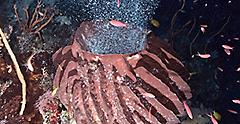
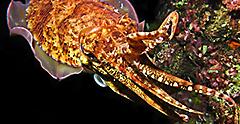
Witnessing the magic of bioluminescence is one of the main reasons to take the plunge in the dark. When the plankton are disturbed by motion, they release light through a chemical compound called luciferin. The word "luciferin" stems from Latin and means "light bringer." It's a mode of distraction: The light is used to ward off predators and help the creatures escape being eaten.
The Caribbean is home to many destinations famous for their sparkling seas and perfect for night diving. Puerto Rico, the Cayman Islands, the Bahamas and Jamaica have beaches with twinkling shorelines, and their night scuba diving would likely be spectacular. In some destinations with bioluminescent plankton, the whitewash of crashing waves will glow with an electric blue hue.
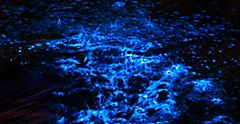
After a full moon, love and light combine throughout the Caribbean when ostracods, or little crustaceans, mate and create flashes of bright blue light. That's amore! Divers can venture on a shore dive from the sandy beaches of Bonaire to see the sight for themselves. And who knows? Maybe the moon, the stars and the fairy lights in the water might weave some enchantment over those who witness the spectacular scene for themselves.
Because water absorbs colors, diving during the daytime reveals discoloration in the reef if you're looking at it with the naked eye. Water first absorbs red, then orange, then yellow and proceeds down the spectrum. After just a few feet under the sea, everything tends to be tinted with a monochrome shade of blue. Night scuba diving with a flashlight in hand allows you to see colors closer to what they truly are with little interference.
Dr. Morse says, "Night diving is amazing for photography. It's a great chance to light up your subject and get a black background behind it to get those stunning portrait shots."
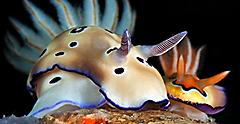
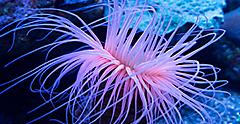
Tips For Scuba Diving At Night
Going on a night scuba dive might seem as though it's an experience reserved for advanced divers only. However, most dive centers host night dives that welcome newer divers because these dives are typically done at sites with calm water and no swell. No matter if your log book has 10 or 10,000 dives, night diving is a worthwhile experience.
Chances are you might feel nervous before a night dive. This is understandable, as we rely on sight to scan our surroundings for predators. Take this sense away, and it can create a feeling of helplessness. However, if you think back to when you learned how to scuba dive, you probably had very similar fears.
If it's been a while between dives, Deris Northman, a PADI Master Scuba Diver Trainer, advises, "Don't have a night dive be your first dive of the trip. Do some normal day dives first to get you back into the ease of breathing underwater. It's important to get comfortable with buoyancy and your equipment again." This also means using gear you're already familiar with and knowing where to access gear you don't typically carry on a dive, like a flashlight or tank banger.
Help your mindset stay calm throughout the day by planning your night dive on a day where your biggest decision is whether to order one coconut or two. Yoga, meditation and diving during the day can help create a sense of peace leading up to the night dive if you're feeling nervous. Opt for water and healthy foods over alcoholic drinks and heavy meals, as nervousness can oftentimes go hand-in-hand with an upset stomach.
Divers new to night diving can also time their dives in a way to make the dive less intimidating. Deris notes, "Some night dives can be done just before the sun sets so you can slowly ease the dive from some light to the dark night."
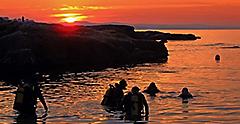
If you're nervous or have any hesitations, talk to your dive guide and buddy beforehand. If you ask, your dive mates can check in with you more frequently and ensure that the dive is going okay. You'll also be able to show each other any underwater discoveries that you find during the dive.
Once you're on your dive, you'll probably realize that it's calmer than you expected. Compared to a day dive, even the busiest reefs seem to slow down. If you're still feeling nervous, inhale and exhale slow, deep breaths to relax.
Some divers prefer to signal with their flashlight rather than their hands like they normally would on a daytime dive. To get your buddy's attention, guide your beam towards your buddy's line of sight and create a small circle or squiggle, then pull the beam towards you. To signal that everything is okay, draw a large circle. As a general rule, drawing a vertical line means yes, and a horizontal line means no. You can also shine the light onto your hand to reveal traditional dive hand signals. The main rule? Avoid shining your light into your dive buddy's eyes or into the eyes of marine animals. Point your beam near the critter rather than directly on it.
Get Royal Deals, Sign Up Today

Getting There
Ready to Explore the Deep, Dark Sea for Yourself?
A dive trip to the islands of the Caribbean is a great place to start.



